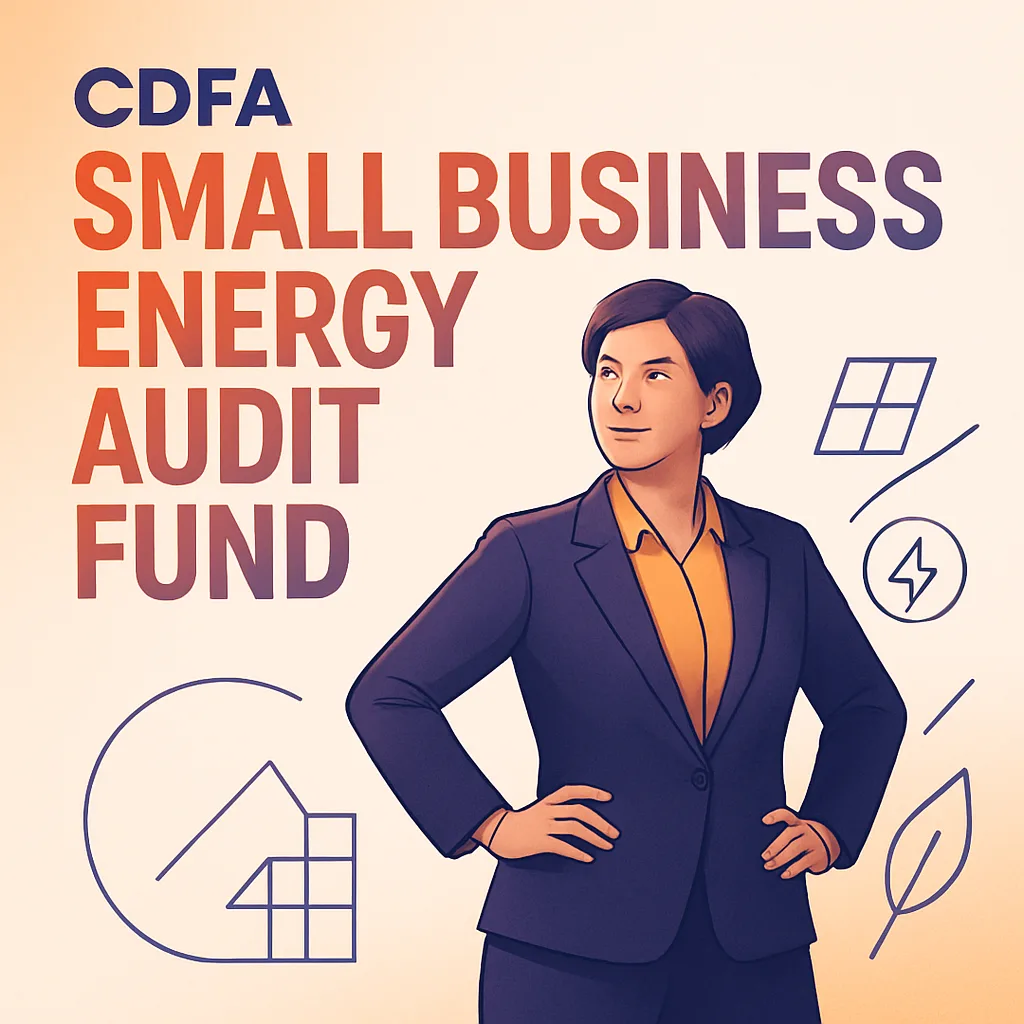
New Hampshire Small Business Energy Audit Fund: Get 75% Off Professional Energy Assessment
CDFA covers 75% of energy audit costs for NH rural businesses & farms. Save $1,500-$3,000 on professional energy assessments. Rolling applications.
Grant Overview
CDFA Covers Most of Your Energy Audit Cost - Save Hundreds on Operating Expenses
New Hampshire's Community Development Finance Authority will pay 75% of your energy audit costs if you're a rural small business or agricultural producer. That means instead of paying $2,000-4,000 for a comprehensive energy assessment, you'll only pay around $500-1,000 out of pocket. The catch? It's first-come, first-served funding and they're pretty strict about who qualifies.
Look, here's what I see happening with businesses who ignore their energy costs - they're basically writing checks to the utility company every month without knowing if they need to. And with energy prices going up like they have been, that's not sustainable. This CDFA program isn't just about getting a cheaper audit. It's about getting the blueprint to cut your energy bills permanently.

Who Can Actually Get This Money
The eligibility rules sound simple until you start digging into the details. Small business grants usually have complicated requirements, but this one's got some unusual twists that trip people up.
Agricultural producers in New Hampshire - you're golden. Doesn't matter if you're in downtown Manchester or the middle of nowhere. Dairy farms, crop growers, greenhouse operations, maple syrup producers - if you're making food or agricultural products for profit, location doesn't matter.
Rural small businesses - this is where it gets tricky. CDFA uses the USDA's definition of "rural," which includes way more places than most people think. Communities with populations under 50,000 typically qualify, which means places like Keene (23,000 people) and Lebanon (14,000 people) are totally eligible.
Q: What if my business is right on the edge of a bigger city?
A: Use the USDA eligibility tool - some suburbs of Manchester and Nashua still qualify.
Q: Does "small business" mean tiny business?
A: No. Most service businesses qualify with up to 500 employees.
You also need to meet SBA size standards, which vary by industry but are more generous than people expect. Most small business funding uses these same standards, so if you've qualified for other programs before, you'll probably qualify here too.
The business needs to be for-profit and in good standing in New Hampshire. Mixed-use buildings work fine - they'll just cover the commercial portion of your property.
What You Actually Get for Your Money
This isn't someone walking around your building with a clipboard. A Level II comprehensive energy audit involves specialized equipment and trained professionals who know what they're looking at. Unlike most business grants that just hand you money, this program connects you with certified energy auditors who use blower door tests, thermal imaging cameras, and power meters to figure out exactly where you're wasting energy.
They'll test your building envelope for air leaks, measure insulation effectiveness, analyze your HVAC system performance, evaluate your lighting systems and controls, and assess opportunities for renewable energy installations. The final report includes specific recommendations with cost estimates, projected savings, and payback periods for each suggested improvement.
Q: How long does the actual audit take?
A: Usually one day on-site, then 1-2 weeks for the detailed report.
Most audits identify potential savings of 15-30% on energy costs. For a business spending $500 monthly on electricity, that's $900-1,800 per year in savings. The audit pays for itself pretty quickly when you look at it that way.
Success Stories That Actually Matter
CDFA helped Wilkins Lumber in Milford get an energy audit that led to a larger USDA REAP grant for efficiency improvements. That's the real value here - the audit becomes your documentation for bigger funding opportunities down the road. Like other small business programs that build on each other, this audit often opens doors to additional funding sources.
A Manchester restaurant found their walk-in cooler was using 40% more energy than necessary due to worn door seals and an aging compressor. The recommended upgrades cost $8,500 but save $3,200 annually - that's less than a three-year payback.
What's interesting is how often businesses discover problems they didn't even know they had. LED lighting upgrades are common recommendations, but so are things like programmable thermostats, upgraded insulation, and HVAC system maintenance that can save hundreds per month.
The Money Part Nobody Talks About
CDFA covers 75% of audit costs, you pay 25%. But here's what the official materials don't emphasize enough - this program is funded by USDA REAP grants plus contributions from New Hampshire's four major utilities: Eversource, Liberty Utilities, Unitil, and NHEC.
That multi-source funding structure means the program has more stability than typical grant programs that depend on annual legislative appropriations. Unlike some small business grants that come and go, this one's been running consistently because it serves multiple stakeholders' interests.
Your 25% share typically runs $500-1,000 depending on your building size and complexity. You pay the auditor directly, then CDFA reimburses you for their 75% portion after you submit receipts and the completed audit report.
Q: What if I can't afford even the 25% upfront?
A: Talk to CDFA during your pre-consultation - they sometimes have payment plan options.
The Hidden Value Most People Miss
The audit report becomes your roadmap for utility rebate programs, federal tax credits, and additional REAP grants. Smart business owners use this single audit to access multiple funding sources for their energy improvements.
NHSaves programs from the utilities can cover 30-75% of efficiency upgrade costs. Federal tax credits apply to renewable energy installations. And if you implement significant improvements, you might qualify for USDA REAP implementation grants that cover up to 25% of project costs.
One audit, multiple funding streams. That's the strategy most successful applicants use.
How to Actually Apply Without Screwing It Up
The pre-application consultation isn't optional paperwork - it's strategy time. CDFA staff use this call to help you understand which improvements might qualify for additional funding and connect you with the right energy auditor for your specific business type.
Q: What should I prepare for the consultation call?
A: Your last 12 months of utility bills and a basic description of your building and equipment.
During this call, they'll review your preliminary eligibility, discuss your energy concerns, help you understand the audit process, and identify potential follow-up funding opportunities. It usually takes 30-45 minutes and can save you months of confusion later.
After the consultation, you'll need to get quotes from eligible energy auditors. CDFA can recommend certified professionals, but you can also find your own as long as they meet the program's requirements.
The online application through CDFA's Grants Management System takes most businesses about 30-45 minutes to complete. You'll need recent utility bills, energy auditor proposals, basic business information, and property details.
Timeline and Realistic Expectations
Applications are rolling, but funding is first-come, first-served. The current cycle runs through February 2025, then new funding typically becomes available in spring.
CDFA reviews applications within two weeks. If approved, you get a commitment letter outlining the grant terms. Then you schedule the audit, pay the auditor, and submit receipts to CDFA for reimbursement of their 75% share.
Q: How fast can I actually get this done?
A: From application to completed audit report, usually 4-6 weeks total.
Common Mistakes That Kill Your Application
Skipping the pre-consultation call is the biggest mistake. CDFA staff catch eligibility issues and help strengthen applications during these conversations. Like other competitive programs, preparation matters more than luck.
Incomplete utility bill documentation is another frequent problem. You need 12 months of bills for all energy sources - electricity, natural gas, propane, heating oil, whatever you use. Missing bills delay the application review.
Don't assume you know whether your location qualifies as rural. The USDA eligibility tool at eligibility.sc.egov.usda.gov gives definitive answers. Some addresses that seem too urban actually qualify, while others that feel rural don't.
What Happens After Your Audit
One year later, CDFA requires a brief report on which improvements you've implemented. This isn't just bureaucratic follow-up - it's an opportunity to access additional resources. Successful businesses often use this follow-up to explore CDFA's Clean Energy Fund low-interest loans for their next round of improvements.
Many participants use their audit results to apply for USDA REAP implementation grants. The audit report serves as required documentation for these larger federal grants that can provide up to 25% of energy improvement project costs.
The audit also positions you for utility rebate programs. New Hampshire's utilities offer substantial rebates for LED lighting, HVAC upgrades, and other efficiency improvements identified in professional energy audits.
Strategic Timing and Grant Stacking
Smart applicants coordinate this audit with other energy-related funding opportunities. Like other business support programs, timing can multiply your benefits.
If you're planning facility improvements anyway, getting the audit first helps you prioritize energy-efficient options. If you're considering renewable energy installations, the audit provides the baseline data required for REAP grants and tax credit applications.
February 2025 is the current application deadline, but new cycles typically open in spring with fresh federal funding allocations. Early applications have better success rates since funding is distributed first-come, first-served.
Getting a comprehensive energy improvement plan implemented while managing normal business operations feels overwhelming. The audit gives you the roadmap, but coordinating contractors, utility rebates, tax credits, and additional grant applications while keeping your business running is honestly a lot to handle. If you're serious about maximizing these energy savings and want professional guidance on implementing the audit recommendations and accessing follow-up funding, that's exactly what we help businesses do at Grantaura. Having someone who understands both the technical requirements and the funding landscape can make the difference between a report that collects dust and real savings that hit your bottom line every month. Get professional grant application support here to make sure you don't leave money on the table.
Donor: Community Development Finance Authority (CDFA), USDA Rural Energy for America Program (REAP), Eversource, Liberty Utilities, Unitil, NHEC
Focus: energy audit, energy efficiency, rural small business, agricultural producers, HVAC systems, lighting upgrades, renewable energy, cost reduction
Region: New Hampshire rural areas, New Hampshire agricultural producers (statewide), USDA eligible rural communities
Eligibility:
- For-profit business in good standing with New Hampshire business location
- Rural small businesses must operate in USDA-designated rural areas (check eligibility tool)
-- Agricultural producers qualify statewide regardless of location
- Must meet Small Business Administration size standards by industry
- Mixed-use properties eligible for commercial space portions only
Benefits:
- Financial Award: 75% of comprehensive Level II energy audit costs (save $1,500-$3,000)
- Technical Assistance: Pre-consultation, auditor recommendations, follow-up funding guidance
- Energy Savings: Typically 15-30% reduction in annual energy costs through identified improvements
- Follow-up Opportunities: Access to utility rebates, tax credits, and additional REAP implementation grants
Deadline: Ongoing - Rolling applications through February 2025, first-come first-served funding
Terms:
- Level II Comprehensive Energy Audit: Professional assessment using specialized diagnostic equipment including blower door tests, thermal imaging, and power monitoring
- 25% Cost Share: Applicant pays remaining audit costs directly to certified energy auditor
- Rural Area Definition: USDA-designated communities typically under 50,000 population (agricultural operations exempt)
- Implementation Reporting: One-year follow-up report required on completed energy improvements
Author: Imran Ahmad has seen too many small businesses struggle with rising energy costs while missing obvious efficiency opportunities. At Grantaura, he helps business owners navigate the complex landscape of energy funding programs because the audit is often just the first step in a larger strategy to reduce operating costs permanently. His experience with over 300 clients has shown that businesses who approach energy efficiency systematically - starting with professional audits and building toward comprehensive improvements - consistently outperform those who make random upgrades without data. The CDFA program represents exactly the kind of strategic foundation that smart business owners use to build long-term competitive advantages through lower operating costs.
How to apply for this grant
We are your trusted grant application partners. You can navigate the entire grant application process with our expert guidance through this simple 5-step process.
Step 1: Application Form
Fill out the "Apply for this grant" form with your information and grant requirements.
Step 2: Eligibility Assessment
Our grant experts will assess your eligibility and notify you via email.
Step 3: Expert Consultation
A dedicated grant expert will be assigned to discuss next steps for your application.
Step 4: Application Submission
Our expert will help you complete and submit your application with all required materials.
Step 5: Final Decision
The grant committee will make their decision and notify successful applicants.













